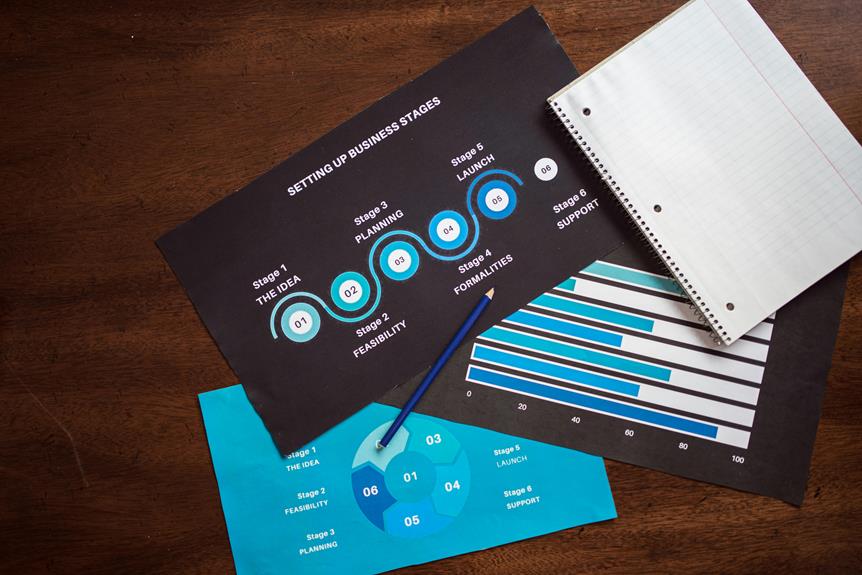Imagine you own a tech blog that's been around for a decade, consistently posting insightful content and steadily gaining backlinks. You might wonder how this domain age impacts your site's SEO authority. Does the longevity of your domain automatically boost your search engine rankings, or are there other factors at play? While it's tempting to think age alone could be a magic bullet, the reality is more nuanced. Understanding how historical data, trust, and credibility intertwine with domain age could be key to mastering your SEO strategy. Let's explore the intricacies of domain authority further.
Understanding Domain Age
When you're analyzing the factors that influence SEO, domain age often stands out as a critical element. Understanding domain age involves looking at how long a domain has been registered and its continuous operation. Older domains tend to be perceived as more trustworthy by search engines. This trust is partly due to the assumption that domains with longevity have survived due to their reliability and quality content. Google and other search engines use domain age as one of the hundreds of signals in their algorithms to determine rankings.
Domain age isn't just about the raw number of years a domain has existed. It's crucial to consider how consistently active a domain has been. If a domain has been dormant for long periods, it mightn't have the same benefits as an actively maintained one. Continuous updates and consistent activity on a domain contribute positively to its perception by search engines.
Analyzing domain age can provide you with insights into competition. For instance, if you're entering a niche where competitors have domains that are decades old, it might indicate established authority. This can help you strategize your SEO efforts, knowing that you'll need to build substantial content and backlinks to compete effectively.
Moreover, older domains often accumulate backlinks, which are critical for SEO. These backlinks can enhance domain authority, making it easier for your pages to rank higher.
However, remember that while domain age can offer certain advantages, it's not the sole determinant of SEO success. Quality content, user experience, and technical SEO play equally important roles.
Historical Data Benefits

Analyzing historical data offers significant advantages in understanding and improving your SEO strategies. By examining your website's past performance, you can identify patterns and trends that inform future actions. Historical data allows you to track the effectiveness of previous SEO tactics and understand what works best for your domain. This insight helps you make data-driven decisions, ensuring your strategies are based on proven results rather than guesswork.
Start by looking at your site's traffic over time. Determine which pages have consistently attracted visitors and which have declined. This analysis helps you pinpoint content that resonates with your audience, enabling you to optimize and expand on successful topics.
Additionally, assess keyword performance historically. Identify terms that have driven substantial traffic and conversions, and consider updating your content to target these keywords more effectively.
Another critical aspect of historical data is backlink analysis. Use this data to determine which links have positively impacted your domain authority. Understanding the quality and relevance of these links can guide your future link-building strategies, helping you focus on acquiring similar high-value links.
Furthermore, historical data can reveal seasonal trends and fluctuations in your website's performance. Recognizing these patterns enables you to anticipate changes in traffic and adjust your content and marketing efforts accordingly.
For example, if your data shows a spike in traffic during a particular time of year, you can prepare targeted campaigns to capitalize on this increase.
Trust and Credibility Factors

How does domain age influence trust and credibility in the eyes of search engines? When assessing websites, search engines like Google rely on several factors to determine trustworthiness, and domain age is a significant one.
Older domains generally have a longer history of maintaining consistent, high-quality content, which can signal reliability. Studies suggest that websites with a longer domain age tend to rank higher in search engine results pages (SERPs). This correlation often results from accumulated backlinks, which serve as endorsements from other reputable sites.
Backlinks are crucial here. An aged domain has had more time to accrue these valuable links. Research indicates that 91% of all pages never get organic traffic from Google, largely due to a lack of backlinks. A domain that's been around longer is more likely to have built a network of links over time, enhancing its credibility.
Search engines perceive these links as votes of confidence from other established sites, further cementing the domain's authority.
Moreover, domain age can mitigate the impact of algorithm updates. Search engines frequently update their algorithms to improve search quality. Older domains with a consistent history of quality content tend to be more resilient to these changes. Data from Moz reveals that domains older than three years are less likely to be negatively impacted by algorithmic shifts.
In essence, while domain age alone doesn't guarantee top rankings, it plays a pivotal role in building trust and credibility. By fostering a robust backlink profile and maintaining content consistency, older domains often enjoy enhanced authority in the digital landscape.
Competitor Domain Age Analysis

While evaluating the competitive landscape, analyzing your competitors' domain age can provide valuable insights into their SEO authority and potential ranking advantages. Domain age can be a critical factor in determining how well a website performs in search engine rankings. An older domain often indicates a more established site, which may have accumulated backlinks, content, and user trust over time.
To understand how this affects your competitive position, assess the age of domains within your industry. Start by identifying your key competitors and using tools like WHOIS lookup or domain age checkers to gather data on their domain registration dates. This data helps you establish a timeline of when each competitor entered the market.
Older domains often have a head start in building authority, so if you find competitors with significantly older domains, it might suggest they've had more time to develop strong SEO foundations. However, don't just stop at age. Analyze the quality of their backlinks, the breadth of their content, and their user engagement metrics.
Older domains mightn't always mean superior content or better backlinks, but they often have more opportunities to build these elements. Compare this data against your domain's age and SEO metrics. Identify gaps where competitors may have capitalized on their domain's longevity, such as stronger link profiles or more comprehensive content libraries.
Leveraging Age for Authority

Maximizing the benefits of domain age involves strategically leveraging the inherent authority it brings to your site. First, recognize that older domains often have more backlinks, which are pivotal in SEO. Analyze your backlink profile using tools like Ahrefs or SEMrush. Identify high-authority backlinks and ensure their relevance to your current content. If some links point to outdated pages, consider creating redirects to maintain link equity.
Content updating is another crucial step. Google favors sites that consistently offer fresh, relevant content. Audit your existing pages and identify those that can be revamped with current data or insights. Use Google Analytics to track page performance and prioritize updates for pages with declining traffic.
Furthermore, older domains typically have more indexed pages. This can enhance your visibility but requires management. Regularly conduct site audits using tools like Screaming Frog to identify and fix any crawl errors or broken links. This ensures Google can effectively index your site, maintaining its authority.
Also, leverage your domain age in external communications. When reaching out for guest posts or partnerships, highlight your site's longevity as a testament to its reliability and authority. Include metrics such as domain rating and organic traffic growth over time to support your claims.
Lastly, don't neglect social proof. Showcase testimonials or case studies from long-term clients to reinforce trustworthiness. Use platforms like Trustpilot to gather reviews and embed these on your site. Demonstrating a history of satisfied users can further boost your perceived authority, complementing the inherent benefits of your domain's age.
Conclusion
You've seen that domain age significantly shapes SEO authority. With historical data highlighting high-quality content, aged domains gain trust and credibility. They're resilient to routine ranking recalibrations, reinforcing reliability. Competitor analysis gives you a glimpse of how aged domains dominate. By leveraging longevity, you're likely to lift your site's visibility and rankings. So, don't underestimate the power of a well-aged domain; it's a formidable foundation for future-focused SEO success.


